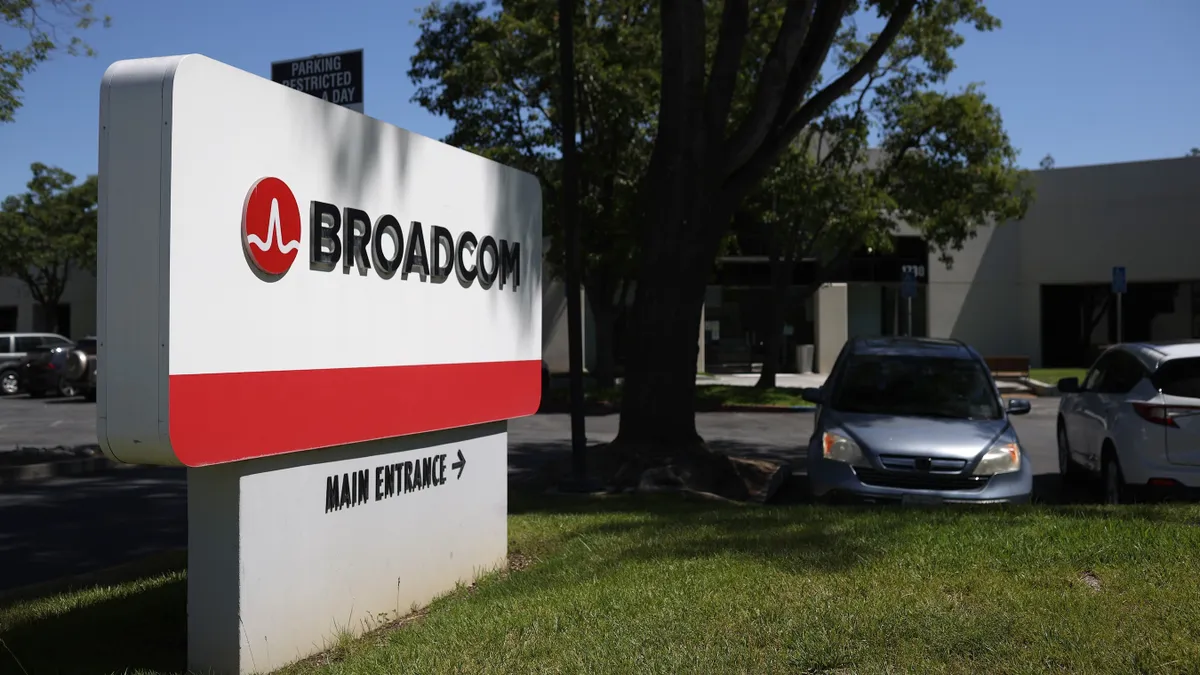Dive Brief:
- Broadcom expanded its footprint in enterprise software with the acquisition of VMware last year but chipmaking remains its core business, according to the company’s Q3 2024 earnings report published Thursday.
- The $61 billion acquisition gave Broadcom a big revenue boost. The company’s consolidated revenue was $13.1 billion for the quarter, up 47% from a year ago. Excluding VMware’s contribution, Q3 revenue increased just 4% year on year, CFO Kirsten Spears said in the report.
- While software accounted for $5.8 billion of Broadcom’s quarterly earnings, semiconductor solutions represented a larger share, totaling $7.3 billion in revenue. “We expect revenue from AI to be $12 billion for fiscal year 2024 driven by ethernet networking and custom accelerators for AI data centers," President and CEO Hock Tan said.
Dive Insight:
Broadcom nearly tripled the size of its software division with the VMware acquisition. Segment revenues were less than $2 billion a year ago, prior to the deal closing.
The growth spurt reflects VMware’s ubiquitous presence in the enterprise tech stack. Nearly 375,000 companies are running VMware solutions, according to Gartner. But many are weighing alternatives in the wake of a Broadcom-led product portfolio consolidation that’s led to as much as five-fold price increases, the analyst firm reported in April.
“Broadcom’s acquisition of VMware is disrupting established platform strategies and impacting sourcing, procurement, budgeting and architectural roadmaps,” according to the report. “CIOs must determine the risk it presents to their business and technology portfolios and educate themselves on viable alternatives if appropriate.”
AT&T is one of the larger companies formally pushing back. In a suit filed in late August, the telecommunications giant alleges Broadcom is trying to bully it into paying millions for software it does not want or need. AT&T currently runs 75,000 VMware virtual machines across 8,600 servers.
Broadcom is nonetheless courting its largest enterprise customers with the comprehensive private cloud bundle it rolled out in July called VMware Cloud Foundation 5.2. A newer version, VCF 9, is already in the pipeline and due for release next year, the company announced last month.
“They're willing to lose a lot of small and even medium-sized clients that don't buy into this broader vision because they’re not interested in piecemeal business,” Scott Bickley, advisory practice lead at Info-Tech Research Group, told CIO Dive. “They want clients that are going to buy in and pay a premium for a combined feature stack.”
The company also has a big cushion in the semiconductor business, which provides the largest hyperscalers with customized chips to satisfy growing demand for AI compute.
“Our customers are hyperscalers trying to deploy more and more capacity in AI data centers,” Tan said during a Thursday earnings call.
Broadcom isn’t interested in the enterprise market for graphics processing units and other AI hardware, Tan said. Its focus is purely on the cloud providers. Enterprises don’t have the resources to invest in the custom silicon Broadcom manufactures, according to Tan. Hyperscalers do.
“There are those few cloud guys — hyperscalers — with the scale of the platform and the financial wherewithal to make it economically rational to create their own custom accelerators,” Tan said. “It’s come to a point where GPUs are more important than engineers to these hyperscalers.”













